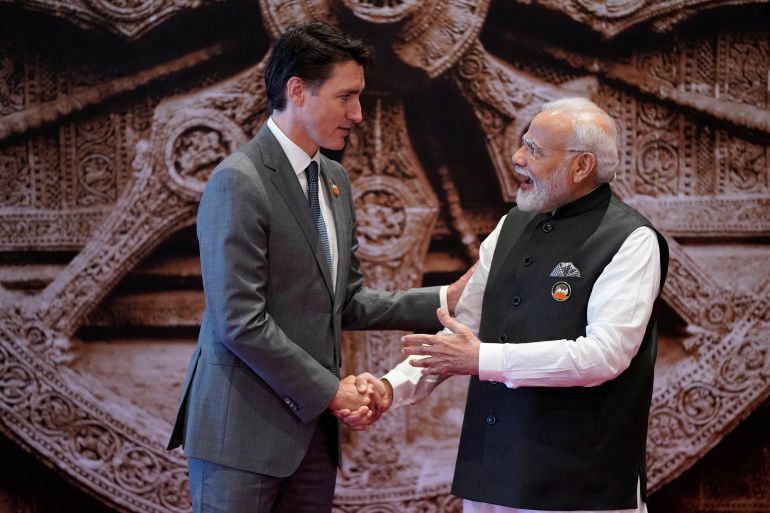Trudeau leaves India after aircraft issues delayed departure from rocky G20
Canadian prime minister’s time at G20 summit in New Delhi highlights growing tensions between India and Canada.

Canadian Prime Minister Justin Trudeau has left India after aircraft trouble delayed his departure following a rocky two-day Group of 20 summit that highlighted growing tensions between Ottawa and New Delhi.
Canadian media outlets reported that Trudeau left the country on Tuesday – two days later than planned – after a mechanical fault detected with the aeroplane was resolved.
Keep reading
list of 3 items‘Diplomatic World Cup’: In G20 summit, India looks for moment in the sun
Canada opens inquiry into allegations of election meddling by China, Russia
Air traffic tracker Flightradar24 showed Royal Canadian Air Force plane CFC01 taking off from Delhi airport shortly after 1pm local time (07:30 GMT).
Relations between India and Canada have been tense over a range of issues, including a decision by Ottawa earlier this month to pause talks on a proposed trade treaty with Indian Prime Minister Narendra Modi’s government.
Modi, who held bilateral meetings with many world leaders during the G20 summit, did not hold one with Trudeau.
The pair spoke on the sidelines of the event, however, with the Indian government saying in a statement after the talks that Modi conveyed strong concerns about protests by Sikh community members in Canada.
Canada has the highest population of Sikhs outside their home state of Punjab in India, and the country has been the site of many protests that have irked Indian government leaders.
In June, India criticised Canada over a float that appeared in a parade depicting the 1984 assassination of Indian Prime Minister Indira Gandhi by her bodyguards, perceived to be a glorification of violence by Sikh separatists.
“They are promoting secessionism and inciting violence against Indian diplomats, damaging diplomatic premises and threatening the Indian community in Canada and their places of worship,” the Indian government said in this week’s statement.
Trudeau later told reporters that Canada would always defend “freedom of expression, freedom of conscience and freedom of peaceful protest” while acting against hatred.
“We are always there to prevent violence, to push back against hatred,” he said, adding that the actions of the few “do not represent the entire community or Canada”.
Rights advocates have accused the Modi government of targeting minorities, as well as overseeing an erosion of democracy and human rights in India – and many have called on world leaders to pressure New Delhi over its rights record.
1/7. Prime Minister Justin Trudeau took an important step in the right direction at the latest #G20 meetings as he showed and voiced discomfort at India's worsening human rights record, while also speaking to issues of foreign interference. pic.twitter.com/ykAV2L7WMy
— NCCM (@nccm) September 11, 2023
The National Council of Canadian Muslims, an advocacy group, welcomed Trudeau’s approach during the G20 “as he showed and voiced discomfort at India’s worsening human rights record, while also speaking to issues of foreign interference”.
“Canada needs to live up to its commitment to international human rights and turn words into action. We cannot build strong trade agreements without strong human rights protections,” the group said on social media.
Meanwhile, a readout from Trudeau’s office on his talks with Modi said the prime minister “raised the importance of respecting the rule of law, democratic principles, and national sovereignty” on the margins of the G20.
The pair also discussed “inclusive economic growth, support for low-and middle-income countries, and access to concessional finance for sustainable development”, the statement said.